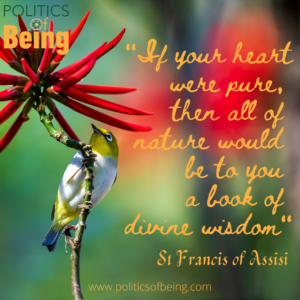
The Interrelation of Nature and Society
From the book chapter: Life
According to French anthropologist Philippe Descola, the ontological separation between humans and nonhumans and the opposition between nature and culture historically only developed in the Western world, it has recently spread like a disease over the rest of the planet. The environmental crisis is a cultural crisis: it is striking to realize that cultural diversity and biological diversity tend to go hand in hand. Indigenous people remind us nowadays that humankind traditionally considered itself as part of nature, a sacred community to which we belong, together with all living beings who are our brothers and sisters, our friends and relatives, as many Native Americans say. Nature is sacred because everything is filled with life, spirit, a vital force: not only the animals and plants but also stones, mountains, rivers, the sun, the moon, the wind, the fire, and of course, our Mother Earth.
At barely two and a half years of age, one of my daughters once asked me, “Dad, what is e-ner-gy?” I was surprised! I took a pause, probably smiled, and breathed before answering her, “That is what makes all things alive.” Traditionally, it is believed that this energy or spirit unites all that is, as part of a cosmic order, named, for example, Tao in China, Maat in Egypt, R’ta or Dharma in India, and Logos in Greece. We can contemplate this divine order, its beauty, harmony, and wisdom in the course, ways, and laws of nature, the original and permanent source of revelation.
“If your heart were pure, then all of nature would be to you a book of divine wisdom,” said Saint Francis of Assisi. This cosmic order, embodied in nature, often also means and is translated as the “path.” Spiritual practices and duties aim primarily at harmonizing ourselves with this path, not only individually but also collectively, as the social community and order are a part, an expression, of a wider sacred community and order. Nature’s life-supporting laws and principles—e.g., self-organization, balance, mutuality, reciprocity, zero waste, localism, unity in diversity, etc.—and its wisdom have long inspired our social systems. This is attested to by many indigenous people, whose collective organizations have allowed them to live long in relative harmony with Mother Earth and with a sense of community, belonging, respect, awe, and sacredness. It is traditionally believed that violating these natural laws and principles inevitably causes a cosmic imbalance that can manifest itself through many different social problems. Preventing these problems through maintaining cosmic harmony is the main inspiration and principle for human “justice,” a concept also sometimes used to translate this natural order. Whether we like it or not, all the systems we are part of or that we are trying to transform are living systems, which are subject to nature’s laws and should align with them.
